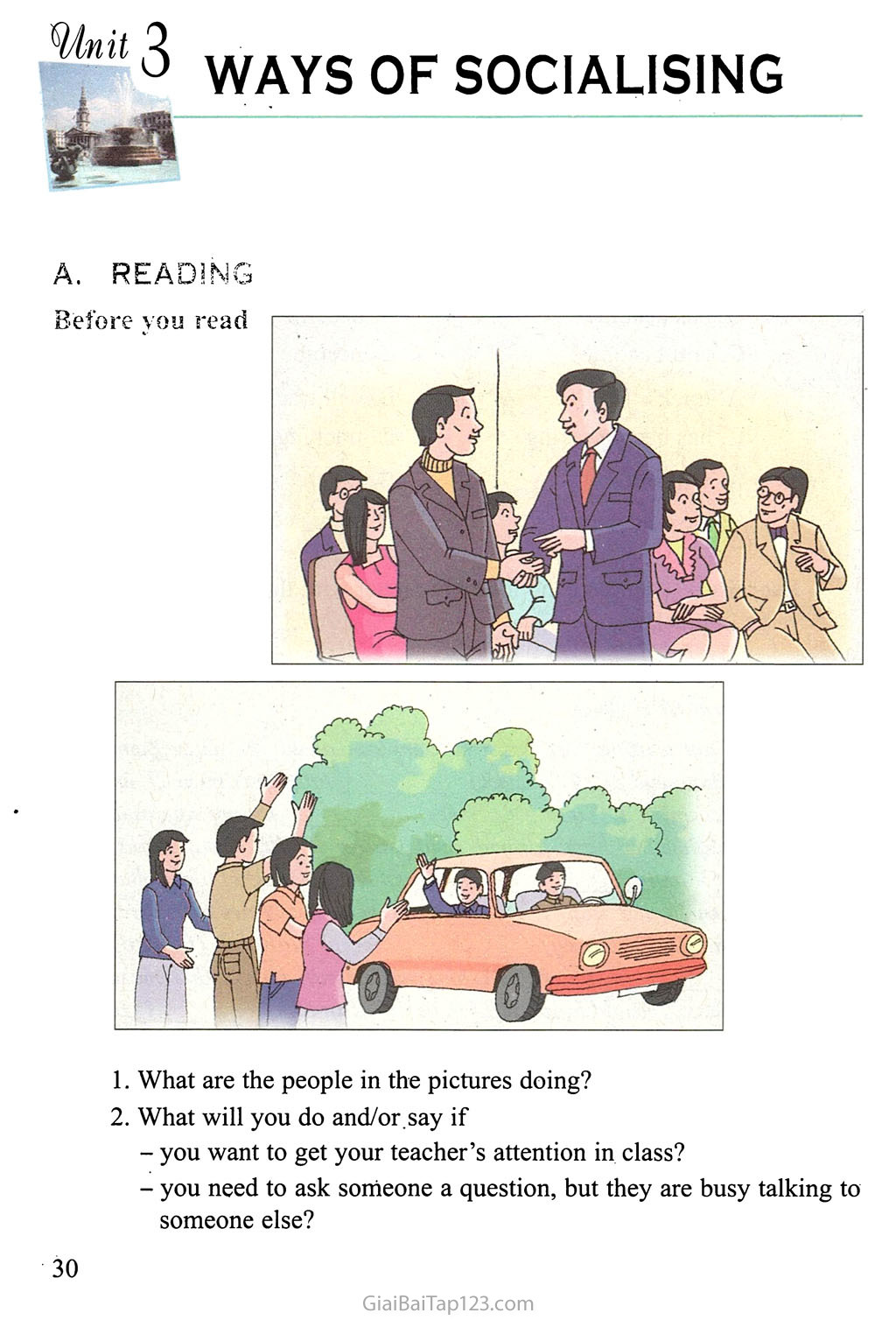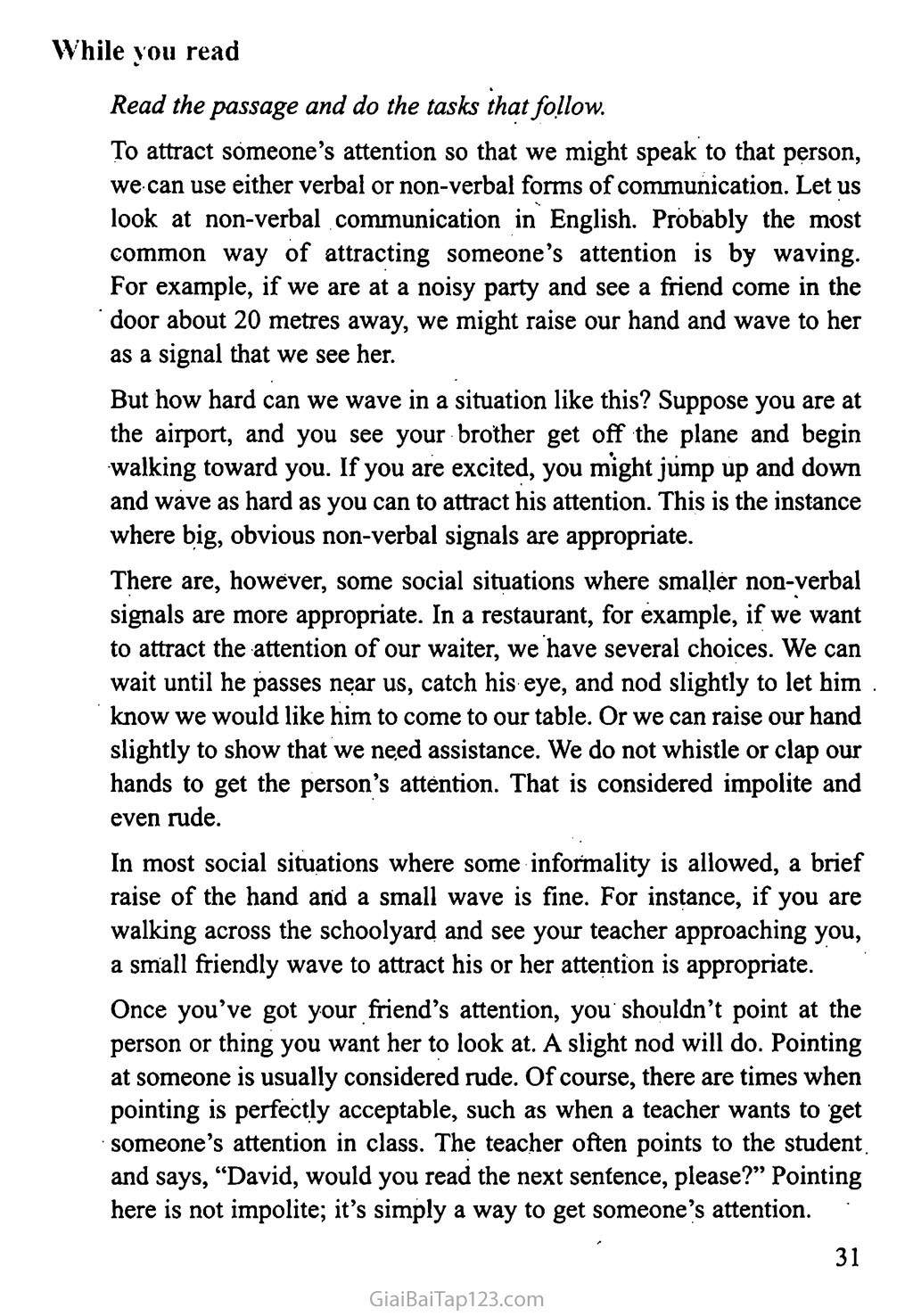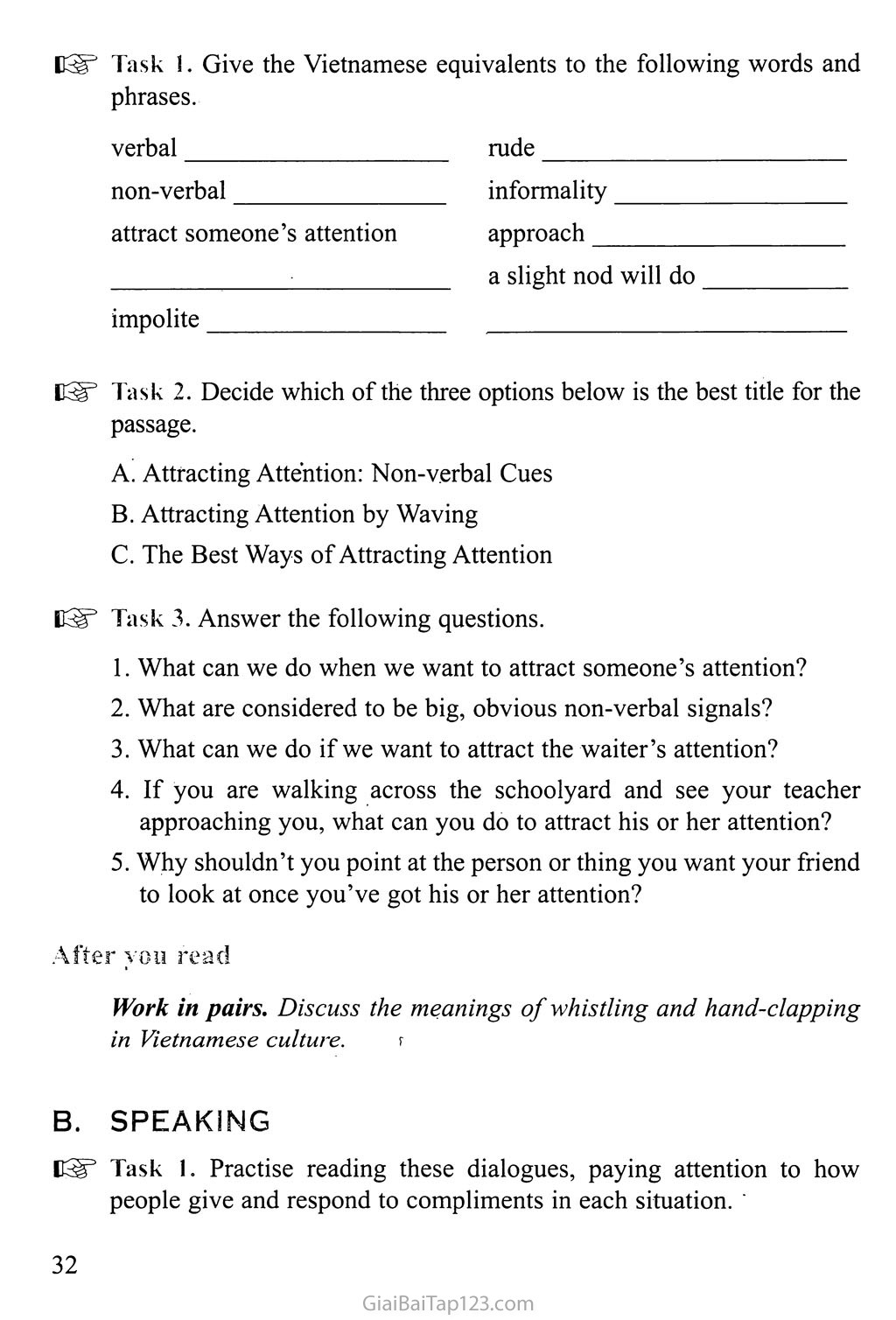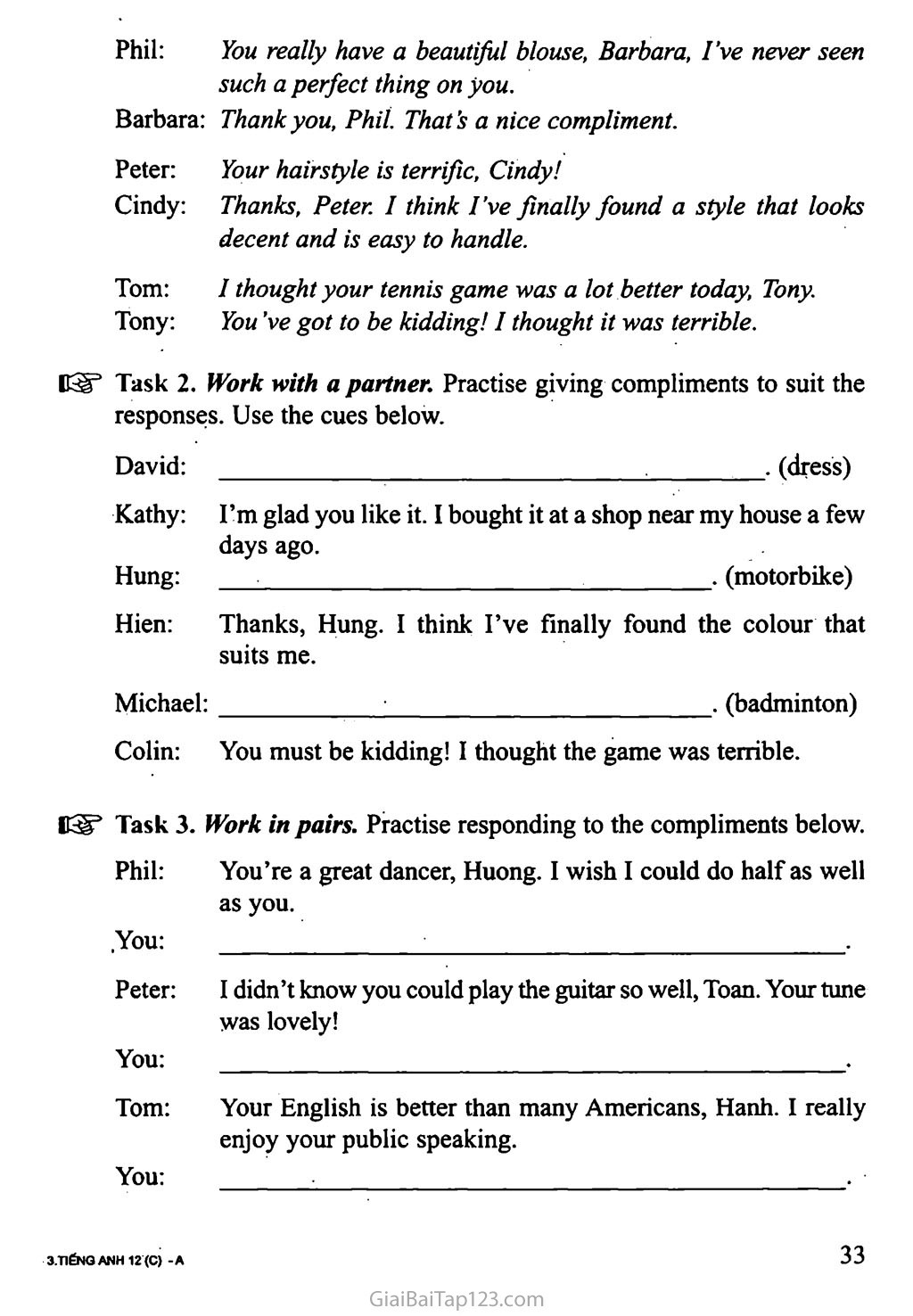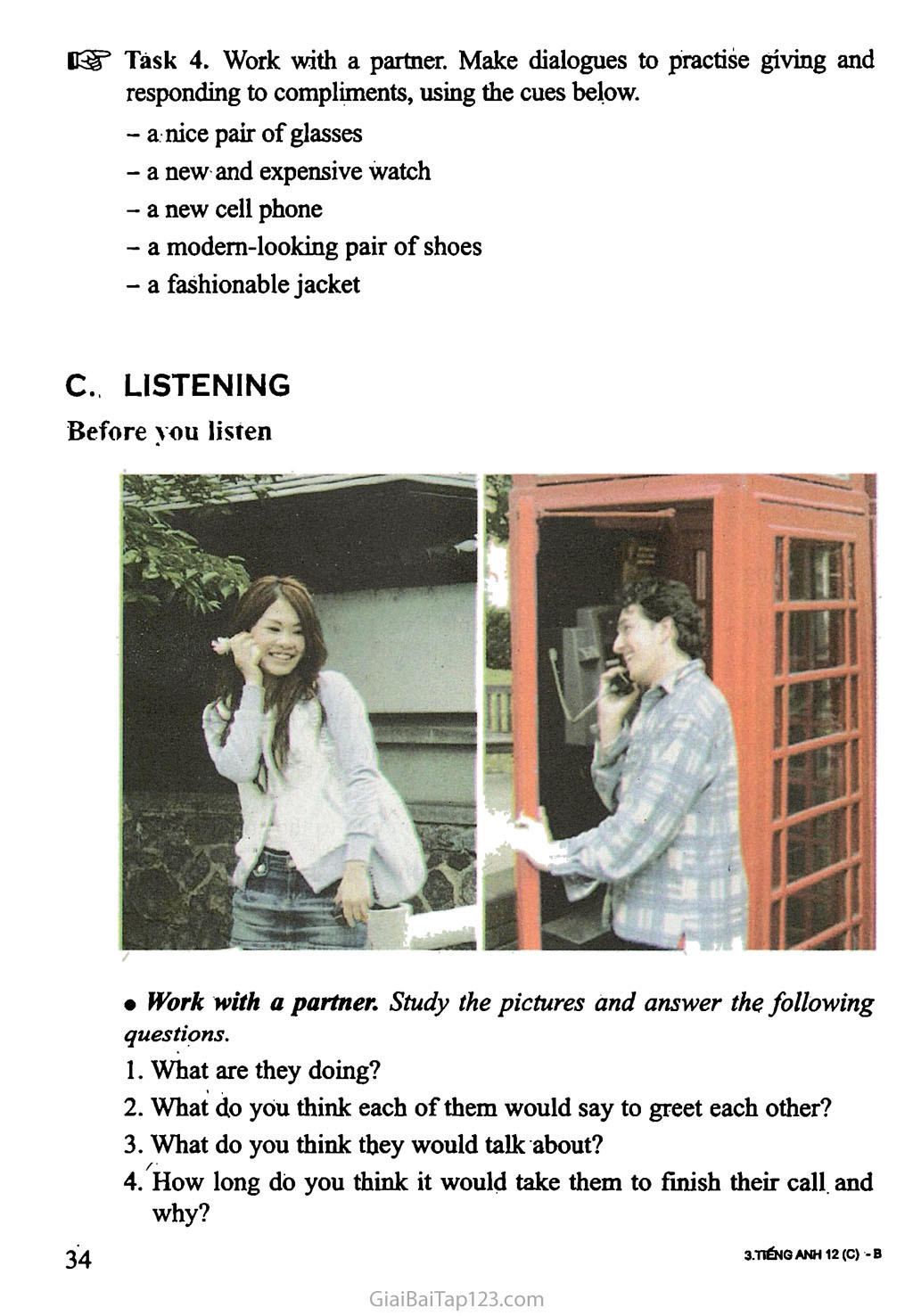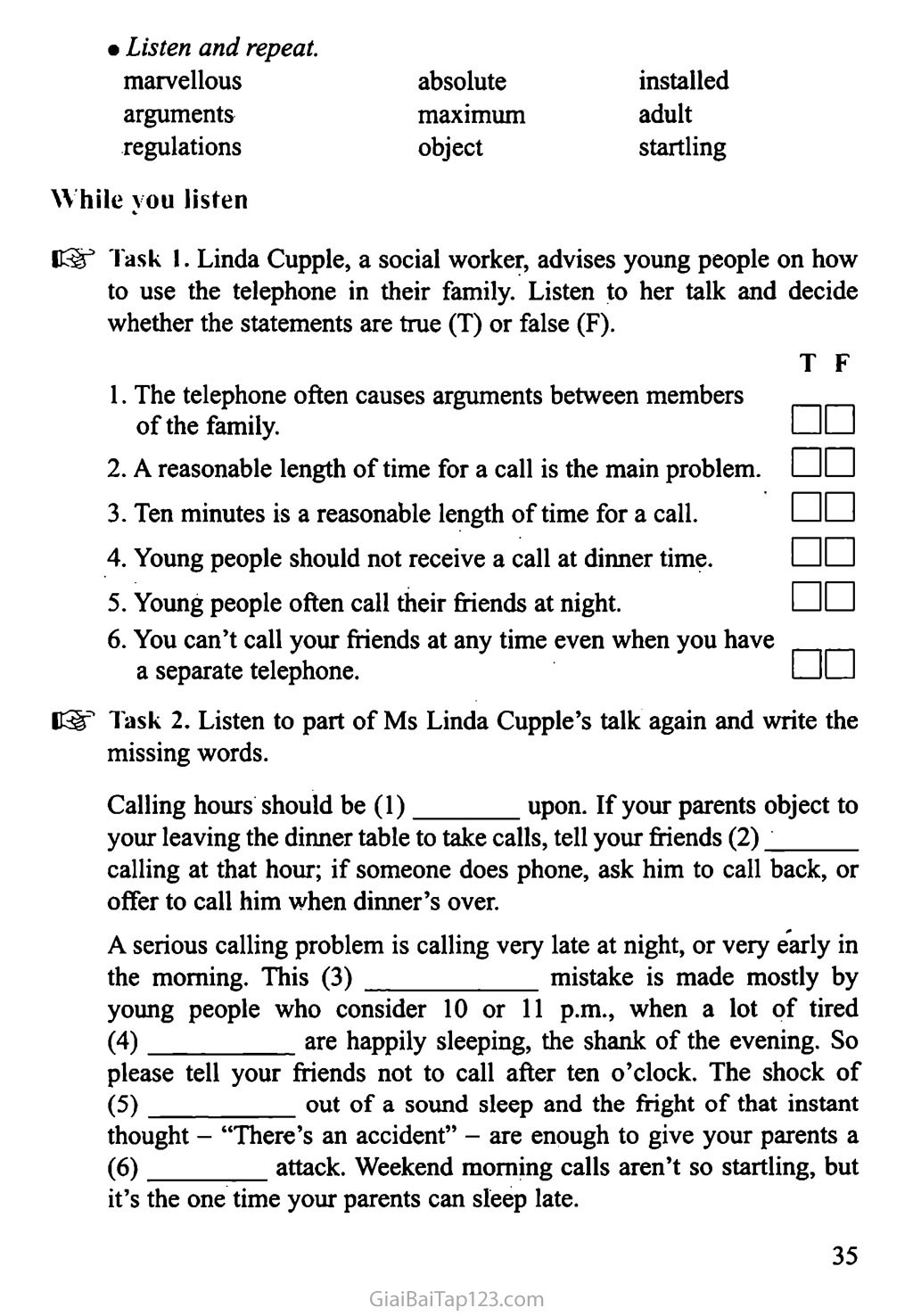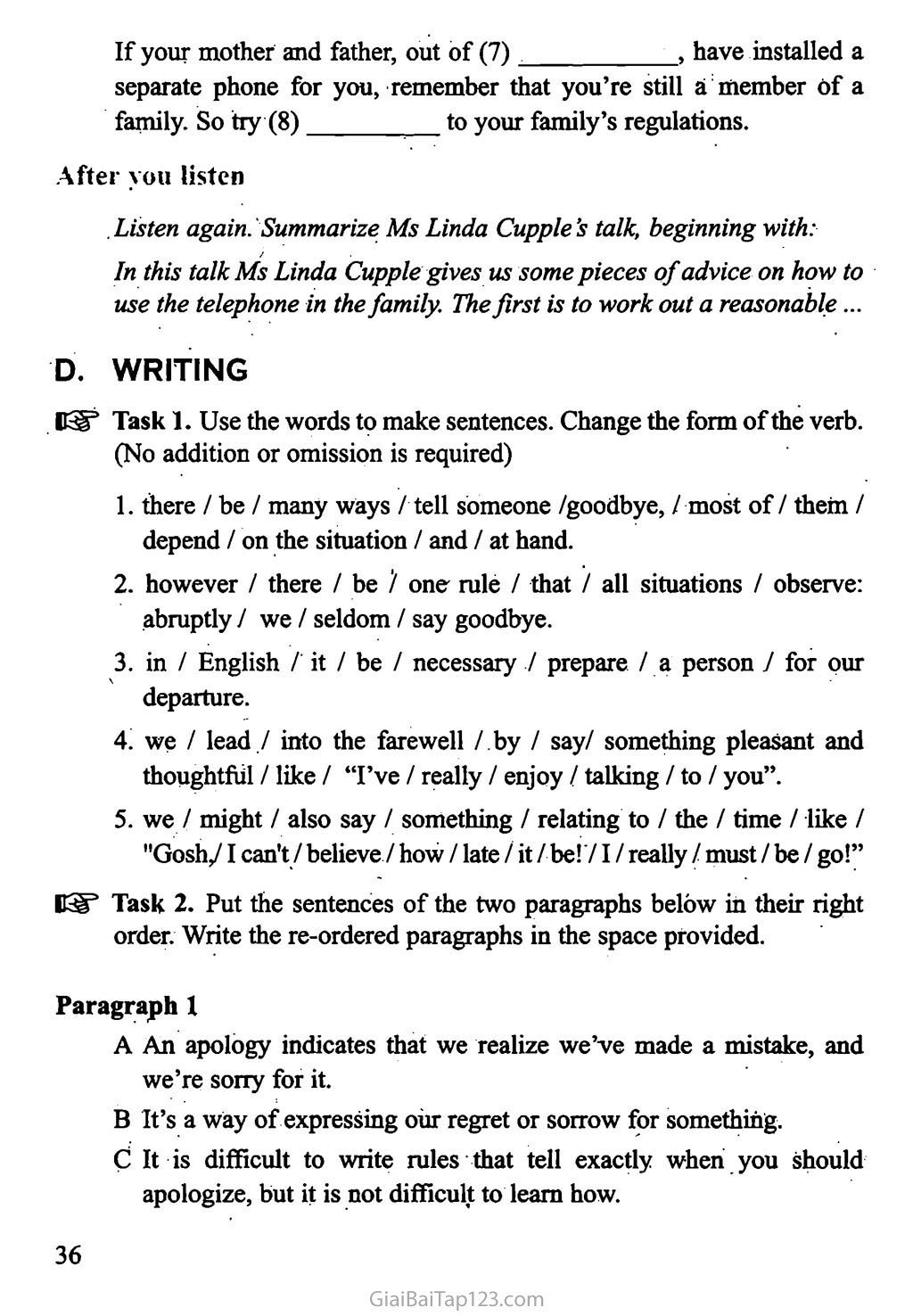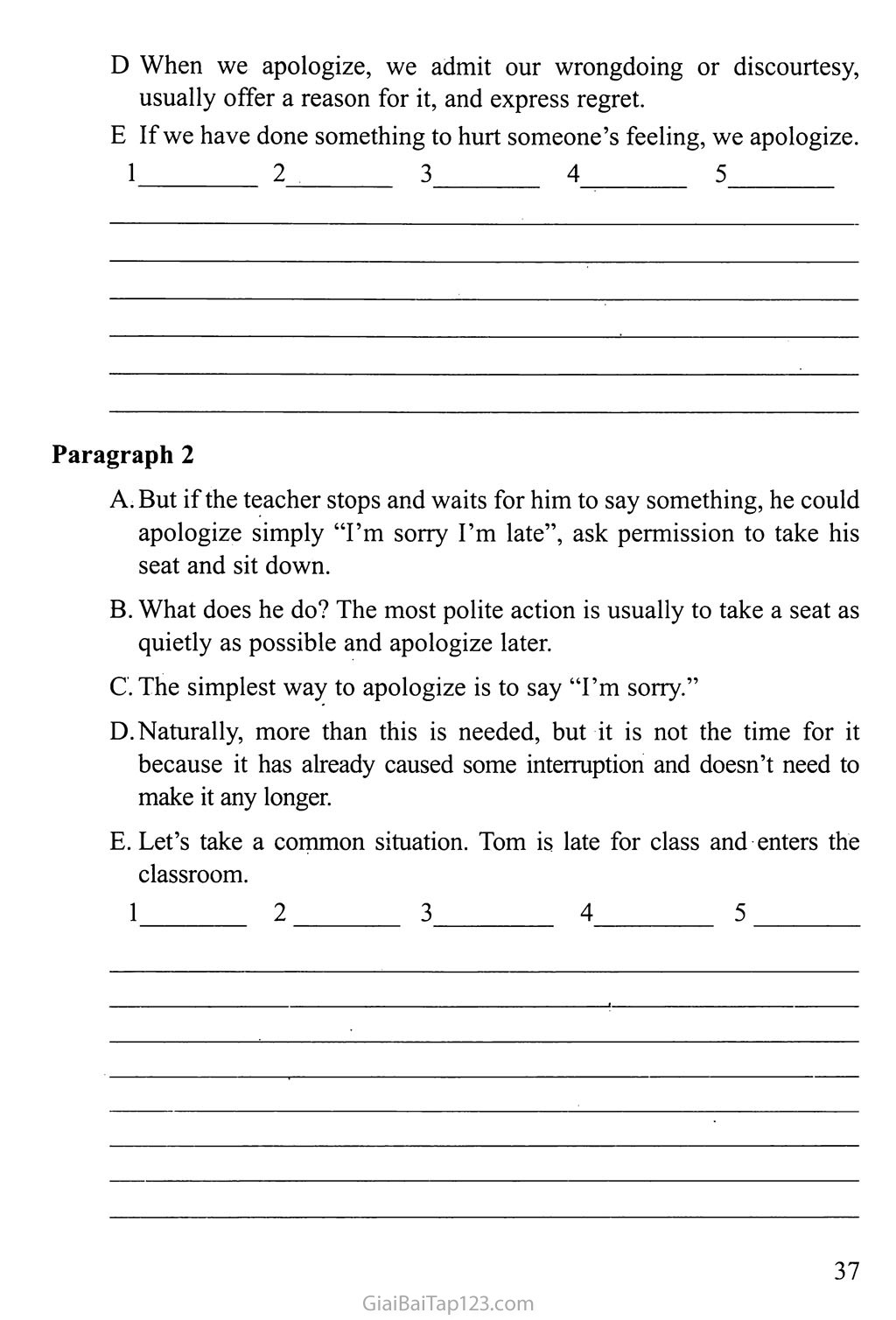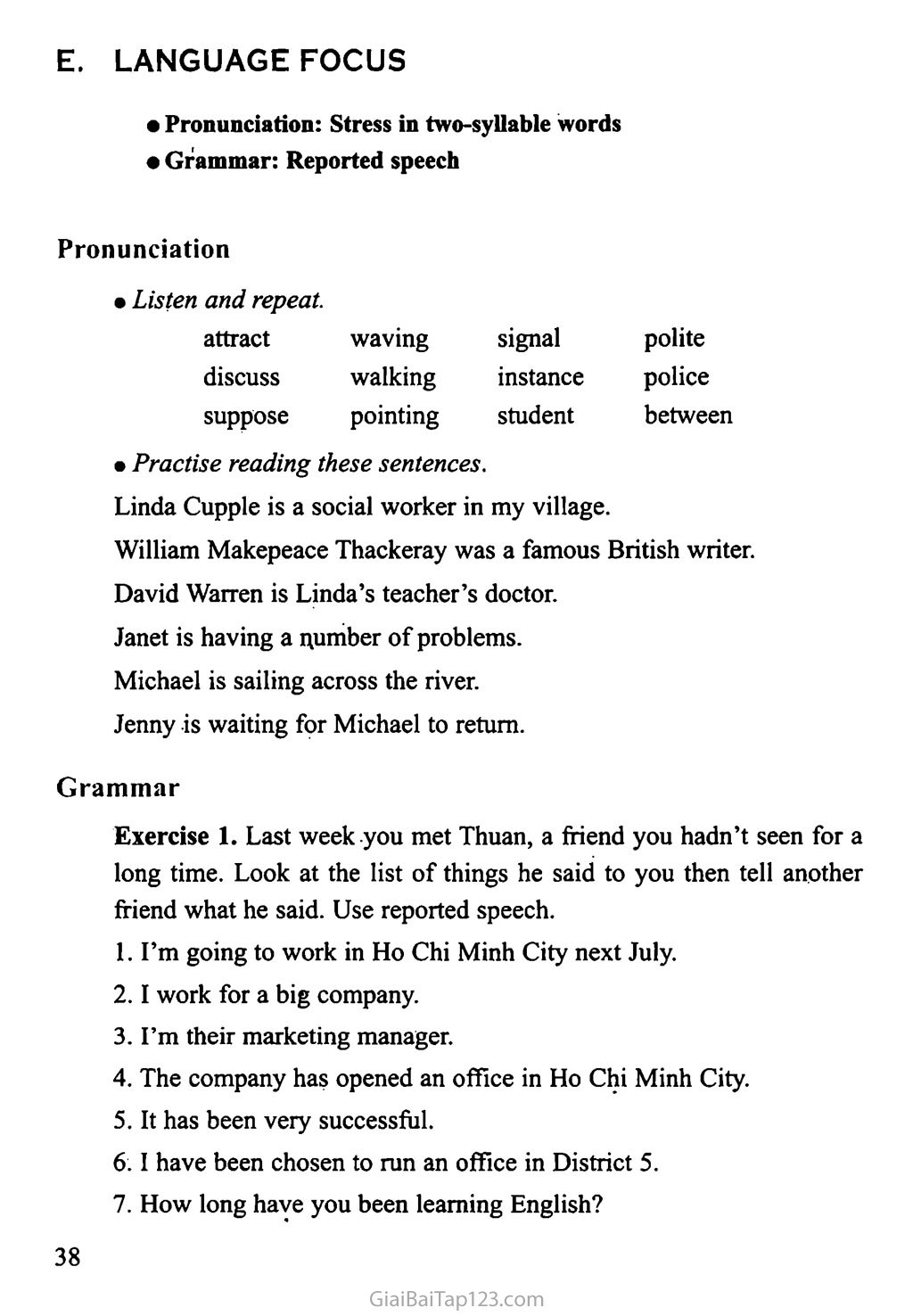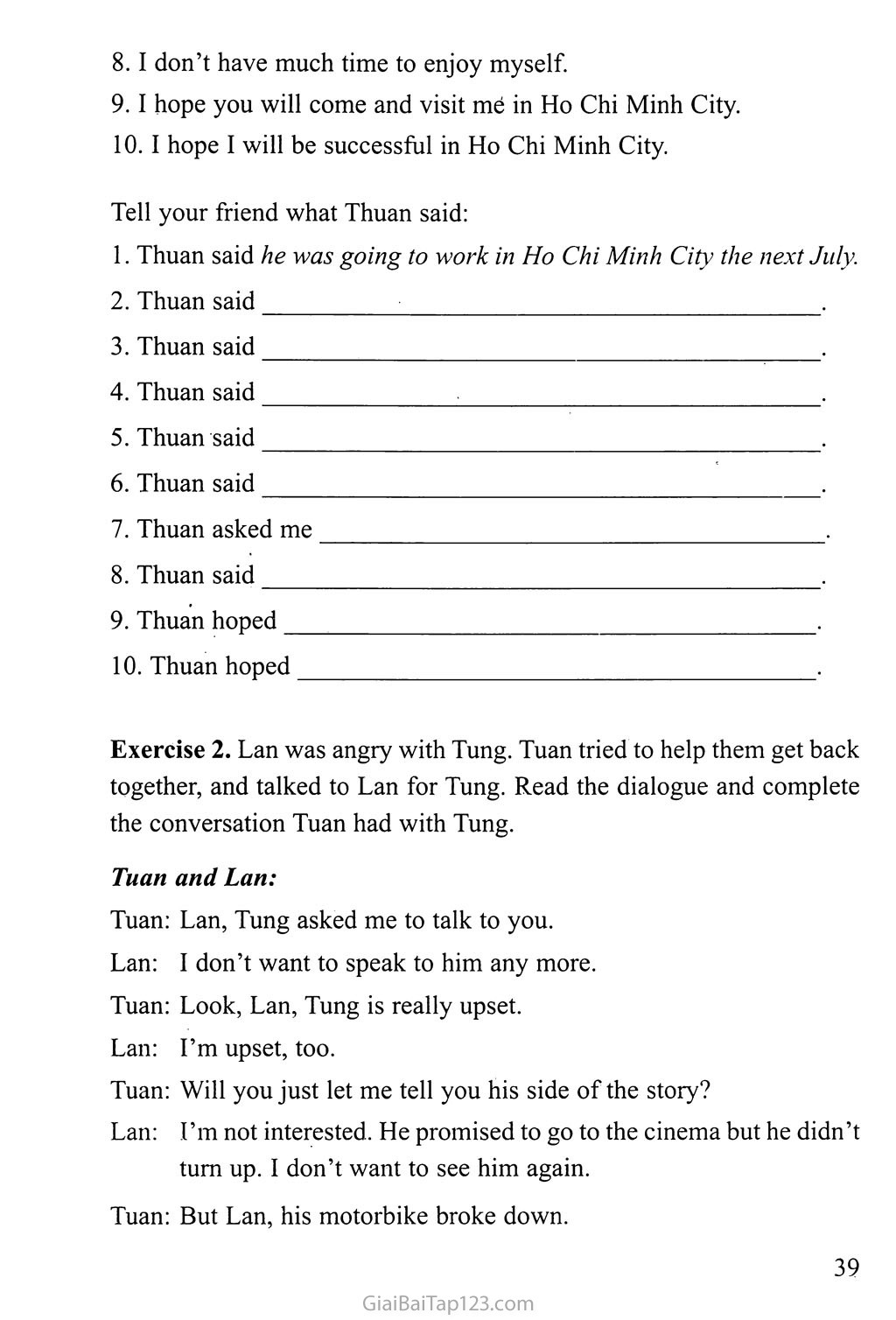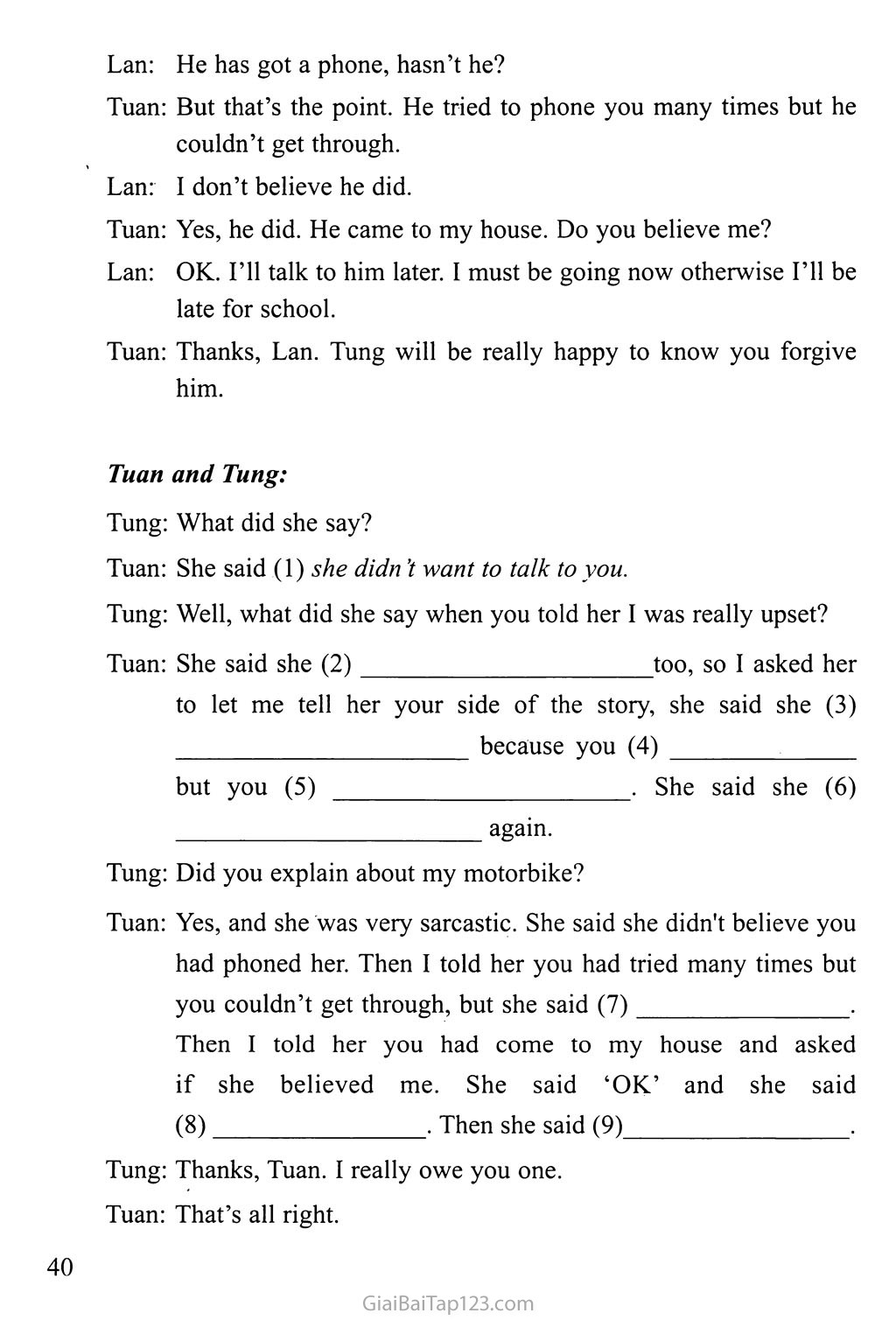SGK Tiếng Anh 12 - Unit 3: WAYS OF SOCIALISING
WAYS OF SOCIALISING A. READING Before you read What are the people in the pictures doing? What will you do and/or.say if you want to get your teacher’s attention in class? you need to ask someone a question, but they are busy talking to someone else? Read the passage and do the tasks that follow. To attract someone’s attention so that we might speak to that person, we can use either verbal or non-verbal forms of communication. Let US look at non-verbal communication in English. Probably the most common way of attracting someone’s attention is by waving. For example, if we are at a noisy party and see a friend come in the door about 20 metres away, we might raise our hand and wave to her as a signal that we see her. But how hard can we wave in a situation like this? Suppose you are at the airport, and you see your brother get off the plane and begin walking toward you. If you are excited, you might jump up and down and wave as hard as you can to attract his attention. This is the instance where big, obvious non-verbal signals are appropriate. There are, however, some social situations where smaller non-verbal signals are more appropriate. In a restaurant, for example, if we want to attract the attention of our waiter, we have several choices. We can wait until he passes near US, catch his eye, and nod slightly to let him know we would like him to come to our table. Or we can raise our hand slightly to show that we ne.ed assistance. We do not whistle or clap our hands to get the person’s attention. That is considered impolite and even rude. In most social situations where some informality is allowed, a brief raise of the hand and a small wave is fine. For instance, if you are walking across the schoolyard and see your teacher approaching you, a small friendly wave to attract his or her attention is appropriate. Once you’ve got your friend’s attention, you shouldn’t point at the person or thing you want her to look at. A slight nod will do. Pointing at someone is usually considered rude. Of course, there are times when pointing is perfectly acceptable, such as when a teacher wants to get someone’s attention in class. The teacher often points to the student and says, “David, would you read the next sentence, please?” Pointing here is not impolite; it’s simply a way to get someone’s attention. dr Task Give the Vietnamese equivalents to the following words and phrases. verbal non-verbal attract someone’s attention impolite dr Task 2. Decide which of the three passage. rude informality approach a slight nod will do options below is the best title for the Attracting Attention: Non-verbal Cues Attracting Attention by Waving c. The Best Ways of Attracting Attention dr Task 3. Answer the following questions. What can we do when we want to attract someone’s attention? What are considered to be big, obvious non-verbal signals? What can we do if we want to attract the waiter’s attention? If you are walking across the schoolyard and see your teacher approaching you, what can you do to attract his or her attention? Why shouldn’t you point at the person or thing you want your friend to look at once you’ve got his or her attention? After you read •z - Work in pairs. Discuss the meanings of whistling and hand-clapping in Vietnamese culture. r B. SPEAKING dr Task 1. Practise reading these dialogues, paying attention to how people give and respond to compliments in each situation. ■ Phil: You really have a beautiful blouse, Barbara, I’ve never seen such a perfect thing on you. Barbara: Thank you, Phil. That’s a nice compliment. Peter: Your hairstyle is terrific, Cindy! Cindy: Thanks, Peter. I think I’ve finally found a style that looks decent and is easy to handle. Tom: I thought your tennis game was a lot better today, Tony. Tony: You ’vé got to be kidding! I thought it was terrible. Work with a partner. Practise giving compliments to suit the responses. Use the cues below. David: . (dress) Kathy: I’m glad you like it. I bought it at a shop near my house a few days ago. Hung: . (motorbike) Hien: Thanks, Hung. I think I’ve finally found the colour that suits me. Michael: . (badminton) Colin: You must be kidding! I thought the game was terrible. Work in pairs. Practise responding to the compliments below. Phil: You’re a great dancer, Huong. I wish I could do half as well as you. Work with a partner. Make dialogues to practise giving and responding to compliments, using the cues below. a nice pair of glasses a new and expensive watch a new cell phone a modem-looking pair of shoes a fashionable jacket Bcfo • Work with a partner. Study the pictures and answer the following questions. What are they doing? What do you think each of them would say to greet each other? What do you think they would talk about? How long do you think it would take them to finish their call and why? installed adult startling absolute maximum object • Listen and repeat. marvellous arguments regulations While you listen Linda Cupple, a social worker, advises young people on how to use the telephone in their family. Listen to her talk and decide whether the statements are true (T) or false (F). T F The telephone often causes arguments between members of the family. A reasonable length of time for a call is the main problem. I II I Ten minutes is a reasonable length of time for a call. I II I Young people should not receive a call at dinner time. I II I Young people often call their friends at night. I II I You can’t call your friends at any time even when you have a separate telephone. DD Listen to part of Ms Linda Cupple’s talk again and write the missing words. Calling hours should be (1) upon. If your parents object to your leaving the dinner table to take calls, tell your friends (2) calling at that hour; if someone does phone, ask him to call back, or offer to call him when dinner’s over. A serious calling problem is calling very late at night, or very early in the morning. This (3) mistake is made mostly by young people who consider 10 or 11 p.m., when a lot of tired are happily sleeping, the shank of the evening. So please tell your friends not to call after ten o’clock. The shock of out of a sound sleep and the fright of that instant thought - “There’s an accident” - are enough to give your parents a attack. Weekend morning calls aren’t so startling, but it’s the one time your parents can sleep late. If your mother and father, out of (7) , have installed a separate phone for you, remember that you’re still a member of a family. So try (8) to your family’s regulations. Listen again. Summarize Ms Linda Cupple’s talk, beginning with: In this talk Ms Linda Cupple gives US some pieces of advice on how to use the telephone in the family. The first is to work out a reasonable ... D. WRITING Use the words to make sentences. Change the form of the verb. (No addition or omission is required) there / be / many ways / tell someone /goodbye, / most of / them / depend / on the situation / and / at hand. however / there / be ? one rule / that / all situations / observe: abruptly / we / seldom / say goodbye. in / English / it / be / necessary / prepare / a person / for our departure. we / lead / into the farewell / by / say/ something pleasant and thoughtful / like / “I’ve / really / enjoy / talking / to / you”. we / might / also say / something / relating to / the / time / like / "Gosh,/1 can't / believe / how / late / it / be!71 / really / must / be / go!” Put the sentences of the two paragraphs below in their right order. Write the re-ordered paragraphs in the space provided. Paragraph 1 A An apology indicates that we realize we’ve made a mistake, and we’re sorry for it. B It’s a way of expressing our regret or sorrow for something, c It is difficult to write rules that tell exactly when you should apologize, but it is not difficult to leam how. D When we apologize, we admit our wrongdoing or discourtesy, usually offer a reason for it, and express regret. E If we have done something to hurt someone’s feeling, we apologize. 1 2 3 4 5 Paragraph 2 But if the teacher stops and waits for him to say something, he could apologize simply “I’m Sony I’m late”, ask permission to take his seat and sit down. What does he do? The most polite action is usually to take a seat as quietly as possible and apologize later. c. The simplest way to apologize is to say “I’m sorry.” Naturally, more than this is needed, but it is not the time for it because it has already caused some interruption and doesn’t need to make it any longer. Let’s take a common situation. Tom is late for class and enters the classroom. 1 2 3 4 5 E. LANGUAGE FOCUS Pronunciation: Stress in two-syllable words Grammar: Reported speech Pronunciation Listen and repeat. polite police between attract waving signal discuss walking instance suppose pointing student Practise reading these sentences. Linda Cupple is a social worker in my village. William Makepeace Thackeray was a famous British writer. David Warren is Linda’s teacher’s doctor. Janet is having a number of problems. Michael is sailing across the river. Jenny is waiting for Michael to return. Grammar Exercise 1. Last week you met Thuan, a friend you hadn’t seen for a long time. Look at the list of things he said to you then tell another friend what he said. Use reported speech. I’m going to work in Ho Chi Minh City next July. I work for a big company. I’m their marketing manager. The company has opened an office in Ho Chi Minh City. It has been very successful. I have been chosen to run an office in District 5. How long have you been learning English? I don’t have much time to enjoy myself. I hope you will come and visit mé in Ho Chi Minh City. I hope I will be successful in Ho Chi Minh City. Tell your friend what Thuan said: Thuan said he was going to work in Ho Chi Minh City the next July. Thuan said _. Thuan said ■ Thuan said . Thuan said . Thuan said . Thuan asked me . Thuan said . Thuan hoped . Thuan hoped ' Exercise 2, Lan was angry with Tung. Tuan tried to help them get back together, and talked to Lan for Tung. Read the dialogue and complete the conversation Tuan had with Tung. Tuan and Lan: Tuan: Lan, Tung asked me to talk to you. Lan: I don’t want to speak to him any more. Tuan: Look, Lan, Tung is really upset. Lan: I’m upset, too. Tuan: Will you just let me tell you his side of the story? Lan: I’m not interested. He promised to go to the cinema but he didn’t turn up. I don’t want to see him again. Tuan: But Lan, his motorbike broke down. Lan: He has got a phone, hasn’t he? Tuan: But that’s the point. He tried to phone you many times but he couldn’t get through. Lan: I don’t believe he did. Tuan: Yes, he did. He came to my house. Do you believe me? Lan: OK. I’ll talk to him later. I must be going now otherwise I’ll be late for school. Tuan: Thanks, Lan. Tung will be really happy to know you forgive him. Tuan and Tung: Tung: What did she say? Tuan: She said (1) she didn’t want to talk to you. Tung: Well, what did she say when you told her I was really upset? Tuan: She said she (2) too, so I asked her to let me tell her your side of the story, she said she (3) because you (4) but you (5) - She said she (6) again. Tung: Did you explain about my motorbike? Tuan: Yes, and she was very sarcastic. She said she didn't believe you had phoned her. Then I told her you had tried many times but you couldn’t get through, but she said (7) . Then I told her you had come to my house and asked if she believed me. She said ‘OK’ and she said (8) . Then she said (9) . Tung: Thanks, Tuan. I really owe you one. Tuan: That’s all right.

